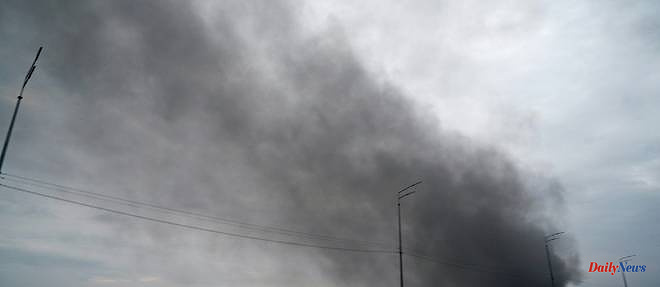Massive Russian missile and drone strikes in Ukraine, the largest in weeks, killed at least six people on Thursday and left part of the population without power, as well as, temporarily, the Zaporizhia nuclear power plant.
A few hours after the missile strikes, the Ukrainian electricity operator Ukrenergo announced the restoration of power to this occupied plant, ruling out the risk of a nuclear incident.
Russia called the strikes, which it carried out using new hypersonic Kinjal missiles, "retaliation" for an incursion into its territory on March 2 by Ukrainian "saboteurs".
At the same time, new tensions have arisen around Moldova, with Kiev denouncing a Russian "provocation" after pro-Russian authorities in Transdniestria, a separatist Moldovan territory bordering Ukraine, claimed to have foiled an attack against its leaders.
Ukrainian President Volodymyr Zelensky denounced Thursday evening, in his daily message on the Internet, "a new attempt by the terrorist state to fight civilization, which temporarily cut off power, heating and water in some of our regions and of our cities.
"Russian missiles killed six Ukrainians today," he added.
In Washington, a White House spokeswoman said, "It is "devastating to see these brutal, unwarranted attacks on civilian infrastructure across Ukraine."
According to the Ukrainian army, the anti-aircraft defense shot down 34 of the 81 missiles launched by Moscow, and four Iranian-made Shahed explosive drones. None of the six Kinjal missiles used by the Russians for this attack could be shot down, according to kyiv.
Russia has regularly bombed Ukrainian energy facilities, plunging millions into darkness and cold, but such attacks had become less frequent of late.
In the Lviv region (west), a shooting in a residential area killed at least five people, the governor reported, while that of the Dnipro region (center-east) indicated that a 34-year-old man had been killed.
Oksana Ostapenko, a resident of the village of Velyka Vilchanytsia in the Lviv region, lost her sister and two brothers-in-law who were in a destroyed house. Two of their neighbors were also killed.
"They had a party (after a birthday), then they fell asleep. And that's what happened," says Ms. Ostapenko. "We thought we were safe here", near the Polish border, she continues.
The strikes cut off electricity, water and heating in Kharkiv, a major city in the northeast, and deprived 40% of users of heating in kyiv, according to the respective authorities.
"Russia is trying to completely destroy the civilian infrastructure of Ukraine, that's why we have to provide (it) with what to defend itself," reacted the head of EU diplomacy, Josep Borrell, from Stockholm.
The gigantic Zaporizhia nuclear power plant, occupied by the Russian army in southern Ukraine, was also briefly cut off from the Ukrainian electricity grid on Thursday, said the Ukrainian nuclear operator Energoatom.
Emergency diesel generators were switched on to ensure a minimum supply of security systems, according to Energoatom, which had warned of the risk of a nuclear accident.
"We are playing with fire", warned from Vienna the director general of the International Atomic Energy Agency (IAEA) Rafael Grossi.
"This is a serious violation of nuclear security, provoked by Russia," added the high representative of the European Union Josep Borell.
In the afternoon, the electricity operator Ukrenergo said it had "restored the power supply to the plant".
In kyiv, explosions affected southern and western districts, according to the mayor. Three people were injured, police said.
On Prospekt Peremoguy, in the west of the capital, three cars parked near a high apartment building were charred, noted an AFP correspondent, and several others damaged.
"There was a very strong explosion," said Igor Yejov, 60, who evacuated the building with his wife. "When it happens very close to you, it's really a feeling of fear."
In Moldova, pro-Russian separatists in Transdniestria assured Thursday that Ukraine had wanted to carry out an attack in the center of their capital, Tiraspol, to "eliminate" their leaders and cause "a large number of victims".
"I have already ordered the Minister of Foreign Affairs to prepare statements to all members of the UN Security Council. (...) We will call (them) to examine this situation and ensure our safety" , declared in Russian the leader of the separatists, Vadim Krasnoselskiï, in a televised address.
Moldovan Prime Minister Dorin Recean said he "did not have confirmation" of these allegations, and the Ukrainian security services (SBU) denounced a "provocation orchestrated by the Kremlin".
Moldova and the West regularly accuse Moscow of using Transdniestria to further destabilize neighboring Ukraine.
Russia announced Monday a meeting in Geneva with the UN on the agreement on Ukrainian grain exports, which expires on March 18, a vital document for the world's food supply.
Moreover, in eastern Ukraine, the battle for the symbolic city of Bakhmout continues to rage.
After announcing the day before the capture of the eastern part of the city, the boss of the Russian paramilitary organization Wagner, Evgeny Prigojine, said Thursday that his fighters had conquered the small village of Doubovo-Vassylivka, north of Bakhmout.
Bakhmout could fall "in the coming days", NATO Secretary General Jens Stoltenberg warned on Wednesday.
In Vilnius, the head of Lithuanian military intelligence for his part estimated that Moscow had enough resources to continue its offensive in Ukraine at the current rate for two years.
09/03/2023 23:00:39 - Kiev (Ukraine) (AFP) © 2023 AFP












